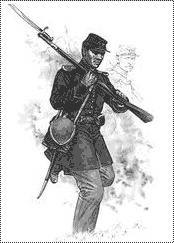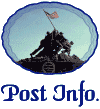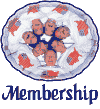![]()

| Only in fairy tales do success stories begin as simply and
clearly as "once upon a time." Real-life success stories are apt to be
complicated by reasons and causes that make identification of a clear-cut beginning
impossible. So it is with the story of the organization now known as the Veterans of
Foreign Wars of the United States (VFW). The VFW was conceived in war, nurtured by time,
and birthed by compassion. In this respect, it was similar to many earlier veterans'
groups. But from its uncertain beginnings, the VFW has grown to be the largest, most
powerful group of overseas veterans the world has ever known. This is no small
distinction, considering the vast numbers of veterans who have banded together over the
centuries. History acknowledges that there were veteran's groups during the time of Caesar's Legions. Writings on the walls of caves indicate their existence, in a less formal sense, thousands of years before. Man's desire to record feats of conquest and valor and his need to communicate with others who shared these experiences led to the formation of these quasi-military associations. It would be impossible to number or name all the veteran's groups that have existed.
While the words "went to war" are technically correct, they are also a little misleading. They imply that the United States had a well-organized course of action that it was ready to put into motion, when in truth the nation fumbled, stumbled, and bungled its way to victory. Although it took the United States Army less than a year to defeat Spanish troops in both the Cuban and Philippine theaters, victory was possible only because the Spanish soldiers were hampered by even worse leadership and equipment than were the Americans. In the thirty-three years since the Civil War, a tight-fisted Congress had virtually destroyed the awesome power that had been the Union Army. Much of the Army's equipment had been sold at auction or was obsolete and in dire need of repair. Although thousands of determined, able-bodied men responded to the call of war, training was severely lacking. Besides poorly trained and equipped soldiers, other problems plagued the Army. The ships used to carry the troops to war were coastal vessels, not designed to venture any great distance from the shore. Because they were intended for short trips, they lacked adequate ventilation for those sleeping below deck and enough sanitary facilities on any level. They also had little or no area for food preparation. Food was a problem not only for troops en route to combat, but also for soldiers in combat. Large quantities of their rations were unfit for consumption. Much of the rest was so poorly packaged that it soon spoiled and became infested with maggots. Ironically, even food which remained edible was often fated to remain on the docks. Means of transporting it to the front were seldom available. The Army's Medical Department was also severely lacking. Most of the Army's doctors were what was known as "Contract Surgeons" - civilians in the military who had no status, authority, or recognition. The physicians were largely ignorant about the treatment of deadly tropical diseases such as yellow fever, and they were faced with a critical shortage of medications and other medical supplies. In the end, less than one percent of the American servicemen shipped overseas died. This survival rate speaks only to the excellent condition of the men, however, not to the conduct of the campaign or the Army's care of them. Significantly, of the 2,430 American casualties in the Spanish American War, only 385 were combat deaths. With little other than "guts" and determination, these "Boys in Blue" gave the United States its first taste of empire. At the peace treaty of December 1898 in Paris, Spain ceded Puerto Rico and Guam to the United States. A stipulation in the treaty also allowed the U.S. to purchase the Philippines for $20 million. Cuba, independent of Spain, remained under U.S. military control for three years. When the first American troops began returning home in the later part of 1898, they were rightfully proud of the service they had given their country. They had performed the duty requested of them, even without the instruments of war that fighting men have the right to expect their countries to furnish. Overseas, out of touch with the realities of life at home, these men believed in their hearts that their nation would be grateful to them. But they were wrong. And because they were wrong, the stage would be set for the appearance of a new kind of veteran's organization - one whose avowed purpose was that such criminal ingratitude would never again rear its head. In time, at least the nation's future veterans would be grateful. |
 The
Spanish American War.
The
Spanish American War.








 E-Mail
E-Mail